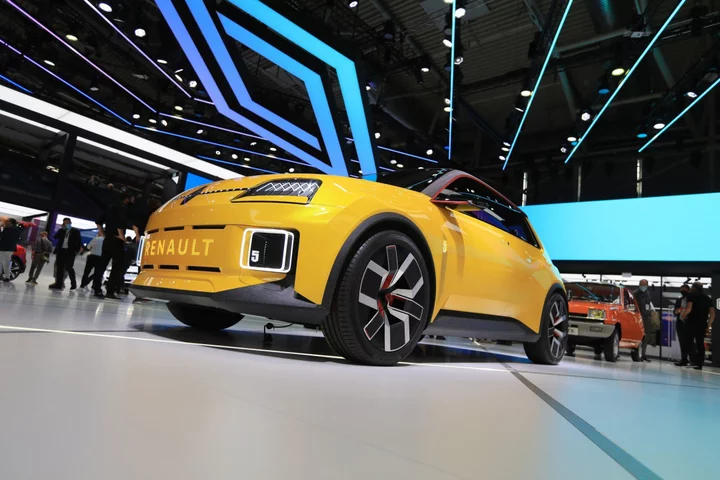Renault SA started with a daring wager. On Christmas Eve in 1898, a young mechanic named Louis Renault bet that the small automobile he’d built would beat the cars of the time up the steepest road in Paris. The stunt was so successful, he secured orders for his voiturette that night.
The French carmaker is now embarking on another big gamble 125 years later, reckoning it can achieve something that’s largely eluded the industry: build affordable electric vehicles and make money on them.
On Wednesday, Renault unveiled a battery-powered Twingo it says will cost less than €20,000 ($21,700). The redesigned city car borrows elements from the popular model introduced in the 1990s and will be positioned to compete with similar offerings from Stellantis NV, Volkswagen AG and the Chinese carmakers expanding in a region hit by a cost-of-living crisis.
“This will be a game-changer, once again, like it was 30 years ago,” Renault Chief Executive Officer Luca de Meo said of the Twingo, which will go on sale in 2026. “We want to make EVs accessible and profitable in this part of the world.”
The Twingo and other electric models — including a new €25,000 version of the Renault 5 supermini, which will start selling next year — represent the core of Ampere, the EV and software business de Meo wants to list next year to raise cash for the storied carmaker’s reinvention.
At an investor event on Wednesday, the CEO touted Ampere’s roadmap to break even in 2025, then earn a roughly 10% operating margin around five years later. The business intends to get there by cutting the number of vehicle parts it sources, speeding up production and relying on Renault’s existing scale of manufacturing and procurement. Long-time partner Nissan Motor Co. and Mitsubishi Motors Corp. will invest a total of as much as €800 million in the entity. Qualcomm Inc. also is considering coming on board, with an agreement to be unveiled soon, Renault Chief Financial Officer Thierry Pieton told reporters.
But to pull off an initial public offering of Ampere, Renault will have to win over investors in a difficult market environment for listings, made all the more complicated by a brutal EV price war. Analysts have been skeptical about Renault’s ability to bring cheap EVs to market quickly and pointing to troubling developments for the broader industry. With batteries remaining expensive and EV production still scaling up, inexpensive electric cars have mostly been limited to short-range mini models in China that are unlikely to catch on in much of the rest of the world.
Tesla Inc. has long talked about but hasn’t followed through on building a $25,000 model. Volkswagen, which is readying an under-€25,000 EV for European markets in 2025, has had to lay off temporary workers and cut shifts because demand for its EVs has fallen short of expectations. The one major carmaker making good money off electric cars is China’s BYD Co., and it’s unclear whether its cheapest fully electric models are profitable.
Renault has built plenty of affordable combustion-engine cars. Its 4CV, covertly developed under German occupation during World War II, was marketed as a “small car for everybody” when sales started in 1947 and became the first French automobile to sell more than 1 million units. The company had even more success with the R4 — the world’s first mass-produced hatchback — and supermini cars like the R5, which was the best-selling model in France for much of the 1970s and ’80s.
To continue that tradition, Renault for years marketed its Dacia Spring — which starts at €20,800 in France — as Europe’s most affordable EV, though the company assembled it in China. The new Twingo is supposed to be Europe-made, possibly in Slovenia, de Meo told Bloomberg Television.
Some investors remain skeptical. Although Ampere’s plan is well-framed, there’s not enough evidence yet that new EVs priced between €20,000 and €25,000 can succeed and be profitable, UBS analysts led by David Lesne wrote in a report. Bernstein’s Daniel Roeska praised the new Twingo and called Ampere a “highly impressive business,” but his team continues to question the need for an IPO.
De Meo isn’t ruling out shelving the Ampere listing if his expectation for an €8 billion to €10 billion valuation of the business isn’t met.
“Being listed is also important to nurture a culture of performance, of transparency,” for Ampere, de Meo said. “But we’re not going to do that at any price.”
--With assistance from Caroline Connan.

